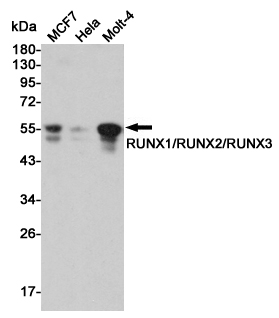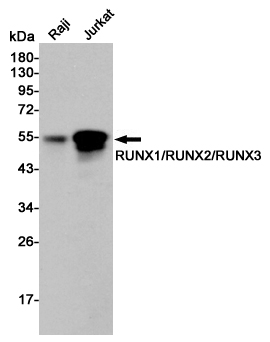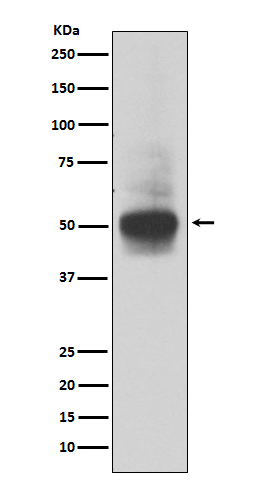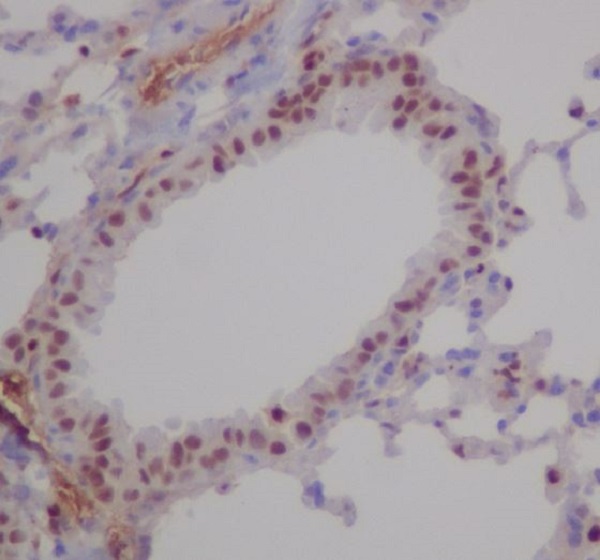



| WB | 咨询技术 | Human,Mouse,Rat |
| IF | 1/20 | Human,Mouse,Rat |
| IHC | 1/50-1/100 | Human,Mouse,Rat |
| ICC | 1/50-1/200 | Human,Mouse,Rat |
| FCM | 1/50-1/100 | Human,Mouse,Rat |
| Elisa | 咨询技术 | Human,Mouse,Rat |
| Aliases | RUNX1; AML1; RUNX2; OSF2; RUNX3; CBFA3 |
| Entrez GeneID | 860/861/864 |
| WB Predicted band size | Calculated MW: 49 kDa; Observed MW: 49 kDa |
| Host/Isotype | Rabbit IgG |
| Antibody Type | Primary antibody |
| Storage | Store at 4°C short term. Aliquot and store at -20°C long term. Avoid freeze/thaw cycles. |
| Species Reactivity | Human,Mouse,Rat |
| Immunogen | A synthesized peptide derived from human RUNX1/RUNX2/RUNX3 |
| Formulation | Purified antibody in PBS with 0.05% sodium azide. |
+ +
以下是关于RUNX抗体的3篇代表性文献摘要,供参考:
1. **文献名称**:*Antibody Validation for Specificity and Sensitivity*
**作者**:Hernandez S. et al.
**摘要**:该研究系统评估了多种RUNX家族抗体(包括RUNX1、RUNX2、RUNX3)在Western blot和免疫组化中的特异性。通过基因敲除细胞系验证,发现部分市售抗体存在非特异性结合问题,强调抗体选择需结合实验体系严格验证。
2. **文献名称**:*RUNX1 in Hematopoietic Development and Leukemia*
**作者**:Speck N.A. et al.
**摘要**:探讨RUNX1在造血干细胞分化和急性髓系白血病(AML)中的关键作用。通过特异性抗体检测RUNX1的核定位及表达水平,揭示了其与白血病发生相关的突变机制。
3. **文献名称**:*RUNX3 as a Tumor Suppressor in Gastric Cancer*
**作者**:Ito Y. et al.
**摘要**:研究发现RUNX3在胃癌中因启动子甲基化而表达沉默。使用抗RUNX3抗体的免疫组化分析显示,其低表达与患者预后不良显著相关,提示其作为抑癌基因的潜在临床价值。
**备注**:若需具体实验方案或抗体货号,建议补充说明应用场景(如WB/IHC/ChIP)及目标亚型(RUNX1/2/3)。
RUNX antibodies are essential tools in biomedical research for studying the RUNX family of transcription factors, which includes RUNX1. RUNX2. and RUNX3. These evolutionarily conserved proteins regulate gene expression by binding to DNA through a conserved Runt domain and partnering with co-factors like CBFβ. RUNX proteins play pivotal roles in development, differentiation, and disease. RUNX1 is critical for hematopoiesis and is frequently mutated in leukemia. RUNX2 drives osteogenesis and is linked to bone disorders, while RUNX3 is involved in neurogenesis, immunity, and cancer suppression. Antibodies targeting RUNX proteins enable researchers to detect their expression, localization, and interactions in cells and tissues.
Specific RUNX antibodies are validated for techniques like Western blotting, immunohistochemistry (IHC), and immunofluorescence (IF). Their specificity is crucial due to structural similarities among RUNX family members. For example, some antibodies distinguish between RUNX1 isoforms (e.g., full-length vs. truncated forms in leukemia). Applications span cancer research (e.g., RUNX1 in AML, RUNX3 in gastric cancer), skeletal biology (RUNX2 in osteoporosis), and developmental studies. Challenges include cross-reactivity and tissue-specific epitope availability. Recent advances include phospho-specific antibodies to study post-translational modifications regulating RUNX activity. Commercial antibodies often specify validated species reactivity (human, mouse, rat) and recommended applications, with knockout-validated clones gaining prominence. Proper controls, such as cell lines with RUNX knockouts, are essential to confirm antibody reliability in experimental settings.
×